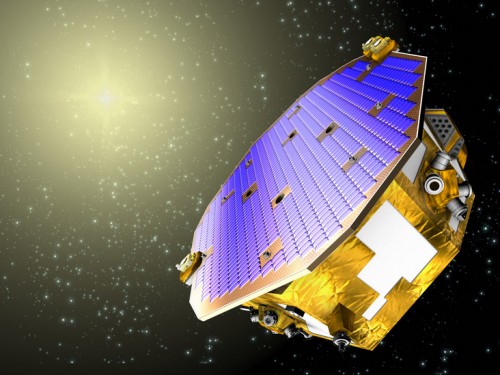Tag archives: quantum computers
A guided tour inside D-Wave’s iconic black box
By Hamish Johnston
Has D-Wave Systems built the world’s first commercial quantum computer? The Canada-based company says it has but some physicists in the quantum-information community beg to differ. Putting aside heady questions like “Does it work?”, I think everyone agrees that the Tardis-sized black boxes that house D-Wave’s processors look great. But what exactly is inside?
View all posts by this author | View this author's profile
Once upon a time…the art of telling a good quantum tale
By Tushna Commissariat
It’s been nearly two weeks since I spent three intense and interesting days in Sweden bundled into a classroom with other journalists and scientists to polish up our knowledge of all things quantum. Since attending the NORDITA science-writing workshop, I have spent a lot of time thinking about one of the main themes of the meeting: “What is the best way to communicate quantum physics to the public?”
Fine-tuning quantum features to develop future technologies
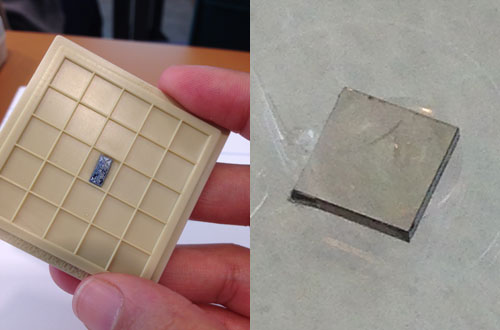
Quantum kit: two superconducting qubits (left) and an artificial diamond with an NV centre (right). (Courtesy: Tushna Commissariat)
By Tushna Commissariat
I’ve left sunny Stockholm and I’m back at the office in blustery Bristol, but I still have a few good quantum tales to tell from the science-writers’ workshop at NORDITA last week. On Thursday, the main speaker of the day was Raymond Laflamme, who is the current director of the Institute for Quantum Computing at the University of Waterloo in Canada. Laflamme – who kick-started his career working on cosmology at the University of Cambridge in the UK as a student of Stephen Hawking – studies quantum decoherence and how to protect quantum systems from it by applying quantum error-correction codes, as well as using nuclear magnetic resonance (NMR) to develop a scalable method of controlling quantum systems.
View all posts by this author | View this author's profile
Reality is a concept you can apply to your cats
By Tushna Commissariat in Stockholm, Sweden
“Reality is a concept you can apply to your cats,” says Rainer Kaltenbaek to a room full of journalists and physicists, “so long as you don’t talk to Schrödinger.” Indeed, he warns us to not bother applying reality to anything that exists at the quantum level as we will just end up disappointed.
I am in Stockholm at a workshop for science writers being hosted at the Nordic Institute for Theoretical Physics (NORDITA) and the idea of completely forgetting “reality” is one of the many interesting things I have been pondering. Over the past two days we have discussed Bell’s loopholes, using your bathtub as an analogue laboratory to study black (and white) holes and learned about problems that even the best quantum computers (if they could be built) will not be able to solve.
Spies are keen on quantum computing, claims Washington Post
By Hamish Johnston
An article in the Washington Post claims that the US National Security Agency (NSA) is funding research into how quantum computers could be used to crack cryptography systems. While the article claims to be based on leaked secret documents, the revelation doesn’t seem to surprise several of the physicists quoted in the piece.
Scott Aaronson of the Massachusetts Institute of Technology (MIT) says that it’s unlikely that the NSA project is much further ahead of public quantum-computing research. His MIT colleague Seth Lloyd adds that it could be five years or more before the NSA or anyone else creates a quantum computer capable of breaking cryptographic systems.
Interestingly, Lloyd alludes to a space-race-like rivalry between the US, EU and Switzerland that is driving the development of code-busting quantum computers.
Quantum hackers foiled – for now
By Hamish Johnston
QKD is a popular quantum-cryptography technique that is already being used commercially. It allows two parties, usually called Alice and Bob, to exchange an encryption key, secure in the knowledge that the key will not have been read by an eavesdropper (Eve). This guarantee is possible because the key is transmitted in terms of quantum bits (qubits) of information, which if intercepted and read are changed irrevocably, thus revealing the actions of Eve.
QKD cannot be cracked if it is implemented using equipment that behaves exactly as expected. Qubits are normally transmitted as single photons, for example, and therefore Alice and Bob must be equipped with single-photon detectors. The problem is that these detectors are not perfect and by simply shining a bright laser at a detector, Eve can trick it into thinking that it has detected a single photon even though that photon has been read by her.
While physicists have come up with several ways of thwarting such attacks, these tend to complicate the QKD process so as to make it impractical. Now, two independent teams of physicists have demonstrated aspects of a new scheme called measurement device independent QKD (MDI-QKD) that seems to close the loophole.
View all posts by this author | View this author's profile
Quantum communication in the back of a pick-up
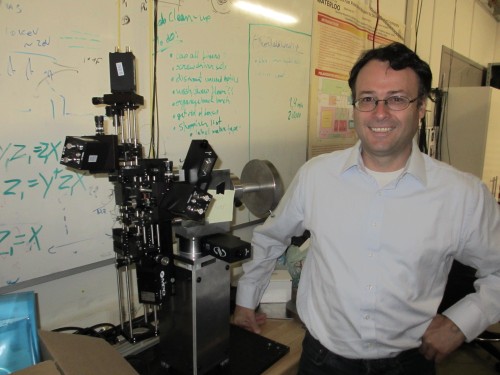
Thomas Jennewein and his quantum receiver will soon hit the streets of Waterloo.
By Hamish Johnston
I’m back from my trip to Waterloo, Ontario – Canada’s “Quantum Valley” – but there is still so much to tell. The photograph above is of Thomas Jennewein of the Institute for Quantum Computing (IQC), who took me on a tour of his lab earlier this week.
Jennewein is standing next to a quantum receiver that he and his colleagues will soon be bolting to a pick-up truck and driving around Waterloo. The plan is to receive quantum communications from a light source that’s on the roof of one of IQC’s buildings. The ultimate goal of the research is to deploy quantum receivers (and transmitters) in space to create a global quantum-communication network.
View all posts by this author | View this author's profile
Life inside the Perimeter
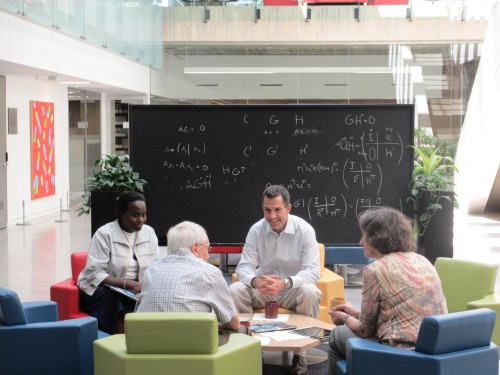
Blackboards and equations galore at the PI.
By Hamish Johnston in Canada’s Quantum Valley
Today I am living the dream, at least for many theoretical physicists. I have my very own office at the Perimeter Institute (PI) for Theoretical Physics in Waterloo, Ontario. It comes complete with free coffee, a blackboard pre-loaded with equations and access to some of the world’s top physicists.
This morning I spoke to Daniel Gottesman, who if I am not mistaken was the first PI faculty member to work on quantum information after joining in 2002. His speciality is quantum error correction and we had a fantastic chat about the directions in which quantum computing could go in the future.
View all posts by this author | View this author's profile
Entering the quantum world
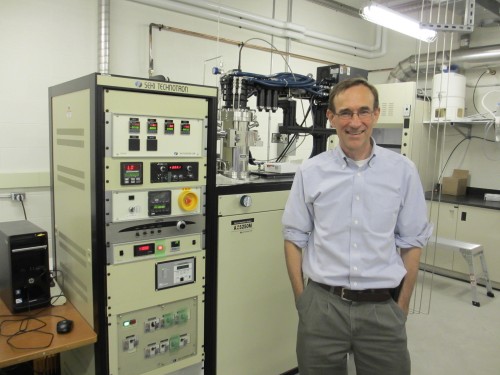
Not a black hole in sight: Raymond Laflamme in one of the IQC labs. The machine behind him makes diamonds for quantum-computing experiments.
By Hamish Johnston in Canada’s Quantum Valley
“We have entered the quantum world and we can control it” is how Raymond Laflamme characterizes the current quantum renaissance that is sweeping across many fields of physics. Laflamme is director of the Institute for Quantum Computing (IQC) at Canada’s University of Waterloo and he began his career at the University of Cambridge as a student of Stephen Hawking, working on cosmology.
A ‘unique’ quantum research centre
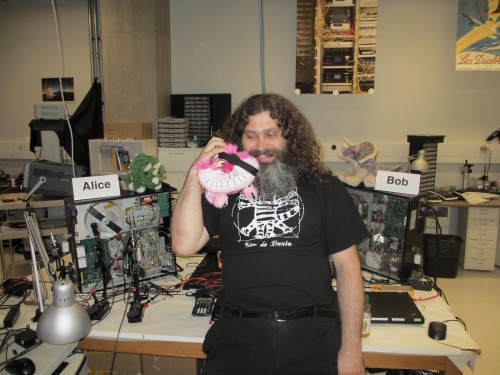
Vadim Makarov with a few old friends.
By Hamish Johnston in Canada’s Quantum Valley
“There’s no place like this in the world,” said Vadim Makarov (above) as we walked up to his lab at the Institute for Quantum Computing (IQC) at Canada’s University of Waterloo. What’s unique about the place, according to Makarov and others I spoke to in Waterloo, is that it brings together a diverse group of researchers (physicists, computer scientists, mathematicians, engineers, etc) in one place to develop quantum-information technology.
